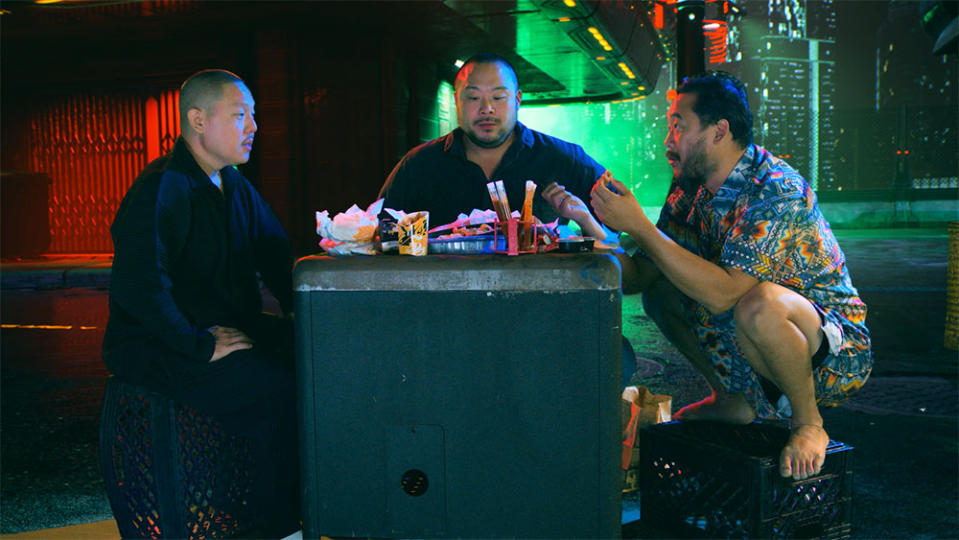David Chang and Morgan Neville Grapple With the Future of Food in Hulu’s ‘The Next Thing You Eat’

What will we be eating in 10 years? In 50? Are we destined for a future of freeze-dried space food and Frankenfoods? Will we have to say goodbye forever to sushi and hamburgers?
Well, maybe, but there will also be deliciousness to be found, according to David Chang and Morgan Neville’s new series “The Next Thing You Eat,” which examines what will be on our plates and how it will get there in the future. The six-part series premieres Oct. 21 on Hulu.
More from Variety
Chang, the innovative chef who launched Momofuku and Majordomo restaurants, previously worked with Neville on the Netflix series “Ugly Delicious” and talked about his friend Anthony Bourdain in Neville’s recent doc “Roadrunner.” But where “Ugly Delicious” delved deeply into the foods of varied cultures and cities, “The Next Thing You Eat” confronts a number of eye-opening scenarios with a playful and informative approach.
Neville says the idea for the series came out of the pandemic as restaurants faced a near-complete meltdown: “Dave was in the middle of incredible pressures, so we started thinking about the future of restaurants, and it morphed into bigger questions of where is everything going.”
“We believed the pandemic was going to accelerate a lot of things in how we lived,” adds Chang.
With episodes based around delivery and robots, burgers, breakfast, restaurants and the ominously-titled “Sushi: Say Goodbye,” Neville brought in a futuristic computer-voiced narrator to keep things light, and incorporated plenty of vintage commercials to show what visions of the future have looked like in the past.
“We didn’t want to do exactly what ‘Ugly Delicious’ had done,” Neville explains. “We wanted it to have its own DNA that would be fun, irreverent and surprising.”
An eclectic list of interviewees signed on, from rapper Anderson .Paak to chefs including Eddie Huang and Corey Lee, to fishers and farmers. Chang says they were “People who had interesting takes, people I talk to. When we had Nyesha [Arrington] and Anderson .Paak, we had a blast cooking burgers. The variety of guests was just so wide — people who could have insight into what was around the corner.”
It might seem counterintuitive for a top chef who focuses on the freshest, most natural ingredients to be touring the sterile labs where scientists are creating lab-grown meats and fish. But Chang says he’s always been interested in the way new technology in food is marketed. “It wasn’t as jarring as I thought, it was something I had been curious about,” he explains.

Courtesy Hulu
The question likely to strike the most fear into the stomachs of coastal creatives is whether eating sushi is doomed. Sushi restaurants are a $22.5 billion industry, the series points out, but asks the question, “Is that sustainable?” Chang visits a lab producing cell-grown salmon, which he pronounces “delicious.”
He warns that the diminishing amount of fish and climate change are definitely going to cause some adjustment. “There’s already no Atlantic wild salmon,” Chang points out.
But will we really need to stop eating fish entirely? Chang doesn’t think so. “The best way is to encourage education and proper practice. If you tell people they can’t do something, it’s not going to work.”
“We’re going to have to make hard decisions,” Neville agrees.
Food is going to look the same — we’ll still be eating fried stuff on a bun — but in different forms. “It’s cricket nuggets, for example,” says Neville.
The “Rise of the Machines” episode looks at how important delivery became during the pandemic. Does it really make sense to have a 2,000 lb. car driving around to deliver a 2-pound burrito? It’s far more efficient to use autonomous delivery — yes, little robots toddling down the streets with your takeout, which is already a reality in some places, and will only grow, Chang predicts.
But there are questions that come along with that, Chang says. “What does robotics mean for immigrants? Will it allow us to increase pay? We have a labor shortage. What happens if people who need a job can’t have that job?”
Climate change is of course a major factor in what the future will look like. “There’s no way not to talk about it, it touches almost every aspect of food harvesting, manufacturing, cultivation,” says Neville. “We’re at a cultural moment now where we can look at what the hell are we going to do about it.”
“There’s a good chance cultivated meat is going to become more dominant,” Chang says. “There’s going to be more people, less land. We should ask ourselves, what does it mean? What are the ethical questions we should start asking ourselves?”
These are serious questions, but as the series travels everywhere from the Tokyo fish market to a “Blade Runner”-esque version of Los Angeles, 2050, Chang serves up some of his signature cheekiness. “I remember not having to eat bugs,” Chang tells a food cart vendor in this dystopian vision of L.A.’s future. “Yeah, what did you eat? Hot dogs? That’s made out of grinded chicken assholes. Bug assholes taste better than chicken assholes,” the vendor informs him.
“You’re going to have to learn to eat insect protein. There’s certain parts of the world where eating insects is common, Korea is one of them,” Chang says. “Nothing is actually new.”
Chang says staying optimistic while confronting these issues was the biggest challenge, but “by the end, I turned a corner. It’s cautious optimism. If we play our cards right, there is a future we can have some control over.”
Best of Variety
The Best Pop Culture Halloween Costumes for 2021: From 'Squid Game' to ' Lil Nas X
Best-Selling Celebrity Memoirs: Billy Porter Joins the Ranks
Sign up for Variety’s Newsletter. For the latest news, follow us on Facebook, Twitter, and Instagram.

 Yahoo Movies
Yahoo Movies 
